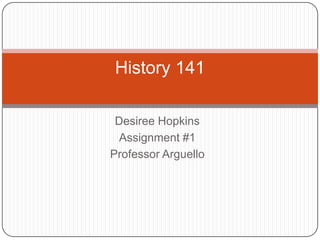
A Difficult Past - How the Americas Change
- 1. Desiree Hopkins Assignment #1 Professor Arguello History 141
- 2. The American in the Nineteenth Century Along with millions of others from Europe and Asia, Chinese migrants increased the ethnic diversity of American populations and stimulated political, social, and economic development in the western hemisphere. During the late eighteenth and early nineteenth centuries, almost all the lands of the western hemisphere won their independence from European colonial powers. American peoples then struggled throughout the nineteenth century to build states and societies that realized their potential in an age of independence. The United States built the most powerful state in the western hemisphere and embarked on a westward push that brought almost all the temperate regions of North America under U.S. control.
- 3. The building of American States After winning independence from Britain, the United States fashioned a government and began to expand rapidly to the west. By midcentury the new republic had absorbed almost all the temperate lands of North America. Yet the United States was an unstable society composed of varied regions with diverse economic and social structures. Differences over slavery and the rights of individual states as opposed to the federal government sparked a massive civil war in the 1860s.
- 4. The Little Ice Age The Little Ice Age (LIA) was a period of cooling that occurred after the Medieval Warm Period. Occurred in the 16th and 19th century. Evidence from mountain glaciers does suggest increased glaciation in a number of widely spread regions outside Europe prior to the 20th century, including Alaska, New Zealand and Patagonia. Several causes have been proposed: solar radiation, heightened volcanic activity, changes in the ocean circulation, or an inherent variability in global climate. Starting in the 13th century, pack ice began advancing southwards in the North Atlantic, as did glaciers in Greenland.
- 5. Little Ice Age Impact on health The cooler climate during the LIA had a huge impact on the health of Europeans. Malnutrition led to a weakened immunity to a variety of illnesses. In England, malnutrition aggravated an influenza epidemic . Bubonic plague is the best known manifestation of the Plague, circulating mainly among small rodents and their fleas. Since, people were cold they stayed inside and that created people to get sick and allowed rats to transfer fleas and diseases to human beings.
- 6. The Louisiana Purchase The Louisiana Purchase was the acquisition by the United States of America. of 828,800 square miles of France’s claim to the territory of Louisiana in 1803. The U.S. paid 60 million francs ($11,250,000) plus cancellation of debts worth 18 million francs ($3,750,000), for a total sum of 15 million dollars for the Louisiana territory ($219 million in 2010 dollars). The Louisiana Purchase encompassed all or part of 14 current U.S. states and two Canadian provinces. The land purchased contained all of present-day Arkansas, Missouri, Iowa, Oklahoma, Kansas, Nebraska, parts of Minnesotathat were west of the Mississippi River, most of North Dakota, nearly all of South Dakota, northeastern New Mexico, the portions of Montana, Wyoming, and Coloradoeast of the Continental Divide, and Louisiana west of the Mississippi River, including the city of New Orleans. (The Oklahoma Panhandle and southwestern portions of Kansas and Louisiana were still claimed by Spain at the time of the Purchase.)
- 7. Explores Prince Maximilian of Wied-Neuwied a German explorer, ethnologist.Wied led an expedition to southeast Brazil from 1815 to 1817. In 1816 he found the tribe of the Botocudos, about which he gave exact details for the first time. On account of the war among the different tribes of the country he was obliged to abandon his original route and remained for some time near some ruins that he had discovered.
- 8. Karl Bodmer was a Swiss painter of the American West. He accompanied German explorer Maximilian zuWied-Neuwied from 1832 through 1834 on his Missouri River expedition. He was hired as an artist by Maximilian with the specific intent of traveling through the American West and recording images of the different tribes they saw along the way.
- 9. The South American Frontier These years saw three colonial wars between the Spanish and Portuguese empires (1763-1801); the Uruguayan Wars of Independence, including multiple Brazilian interventions (1810-28); ten-year civil wars in both Uruguay and Rio Grande do Sul (1835-52), ending with another Brazilian intervention (repeated yet again in 1863-65); the major Paraguayan War (1865-70), in which both Uruguay and Brazil participated; the Uruguayan Revolution of the Lances (1870-72); the Brazilian Federalist Revolution (1893-95); the Uruguayan Revolutions of 1897 and 1904; and the Brazilian Revolution of 1923. The honor of men in the nineteenth-century borderland depended on how well they upheld the standards of the groups in which they sought recognition. violence was symbolic. The attacker hoped to show something about himself rather than simply destroy his opponent, which seldom served any useful end. The violence was expressive rather than instrumental. Men lived prescribed roles as best they could, and their honor, adjudicated by the group, was a measure of how well they succeeded. The role of each person was dependent upon the group to which he belonged, and the gaucho culture included competition with knives.
- 10. Carlota Lucia de Brito Carlota's story must be understood as more than simply the account of a woman who ruins one man's life. Carlota knew she would never be accepted as a full member of the community she entered when she moved to Areia in the drought of 1845. She had refused to confine herself to a role others sought to impose. She was not willing even to subject herself fully to the man with whom she lived. The self-assertion and independence of this woman, who moved beyond the boundaries of family hierarchy perceived as so vital to social order, contributed, in the final analysis, to the community's outrage against the Santos Leal family